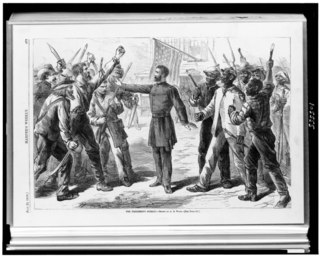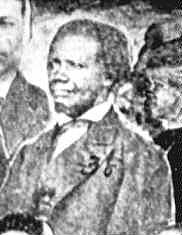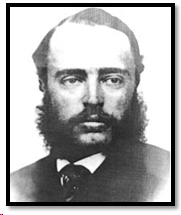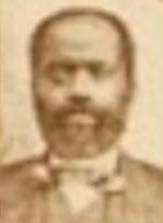Related Research Articles

The Bureau of Refugees, Freedmen, and Abandoned Lands, usually referred to as simply the Freedmen's Bureau, was a U.S. government agency of early post American Civil War Reconstruction, assisting freedmen in the South. It was established on March 3, 1865, and operated briefly as a federal agency after the War, from 1865 to 1872, to direct "provisions, clothing, and fuel... for the immediate and temporary shelter and supply of destitute and suffering refugees and freedmen and their wives and children".
Joseph Crews was a Reconstruction militia leader who served as a member of the South Carolina House of Representatives from 1874 until his assassination in 1875. He was the state's highest-ranking military official in the 1870s and was put in charge of the state militia whose main purpose was to protect African-American voters. African-Americans were 58.9% of the population of South Carolina in 1870. He was reportedly murdered by Democrats in the run-up to the 1876 South Carolina gubernatorial election.

William Beverly Nash was a barber, shoe shine, porter, waiter, and state senator in South Carolina. An African American, Nash was born enslaved in Virginia, Nash gained his freedom at the age of 43 with the passage of the 13th Amendment. After the American Civil War, he became a state legislator during the Reconstruction Era. He was instrumental in drafting South Carolina's Constitution of 1868, and held several committee positions in the state government over his career. He held his office for 21 years before resigning.
Simeon Farr was an American politician who was elected as a state representative in 1868 in South Carolina during the Reconstruction era. He represented Union County, South Carolina. His photograph was used in a composite of Radical Republican officials from South Carolina. His name is spelled Simon Farr in an 1868 House document.

Junius S. Mobley, also known as June Mobley, was a politician in South Carolina. He was considered an ultra-radical, and was one of South Carolina's 1868 Radical Republican members of the Legislature. He reportedly became a preacher after the Reconstruction era. Mobley was a political leader during the Reconstruction era in South Carolina and was involved in the distribution of ammunition to freedmen. He was part of the Union Brotherhood that replaced the Union League in 1872. Mobley was from Union County, South Carolina. John Schreiner Reynolds wrote about Mobley and other African American legislators in 1905. He was not a fan of Mobley's, and described him as "mulatto" and said he gave incendiary speeches causing bloodshed for the "men of his own race". He also referred to Mobley as a "vicious and mouthy Negro".

Edward Charles Mickey was a Reconstruction era legislator in South Carolina. His occupation was listed as tailor and minister. He served in the South Carolina House of Representatives from 1868 until 1872. He was one of many African American legislators who served as Republicans in South Carolina's House and Senate in 1868. He represented Charleston County. He was born in Charleston, South Carolina.

Sancho Saunders was a member of South Carolina's House of Representatives during the Reconstruction era. He represented Chester County, South Carolina. He was documented as a literate Baptist minister who was a slave before the American Civil War. He was African American. His photograph was included in a montage of Radical Republican South Carolina legislators.

Justus Kendall Jillson (1839–1881) was an American educator and politician. He served as South Carolina Superintendent of Education and in the South Carolina Senate. He was a Republican.
Henry W. Webb was a political leader in Reconstruction era South Carolina. He was a delegate to the South Carolina Constitutional Convention of 1868 and elected to the South Carolina House of Representatives the same year.

John Hannibal White was a delegate to South Carolina's 1868 Constitutional Convention, a two-term member of the South Carolina House of Representatives, and a state senator in South Carolina. He worked as a blacksmith.
Hercules Simmons, sometimes spelled Simons was a state legislator in South Carolina during the Reconstruction era. He represented Colleton County.
William U. Saunders was a barber, soldier, politician, and lawyer who represented Gadsden County, Florida, in the Florida Legislature during the Reconstruction era.
Franklin F. Miller was a politician in South Carolina. He represented Georgetown, South Carolina, at the Constitutional Convention of 1868 and served in the state legislature. His photograph was included in a montage with other Radical Republican legislators. He was identified as "colored" and had not been recorded on tax roles. A document related to the 1868 Convention identifies him as white.
William M. Thomas was an African-American Republican politician during the Reconstruction era. He was a minister affiliated with the African Methodist Episcopal Church. He represented Colleton County in the 1868 South Carolina Constitutional Convention and in the South Carolina House of Representatives from 1868 until 1876. He was also an officer in the state militia and was a delegate to the 1876 Republican National Convention. He was categorized as "colored". He and Joseph D. Boston were the only African Americans to serve all four terms during the Reconstruction era in the South Carolina House.
Richard M. Valentine was elected as a minister, farmer, and state legislator-elect in South Carolina during the Reconstruction era. He resigned before serving.
Bruce H. Williams was a state legislator in South Carolina.
Sanders Ford was a farmer and state legislator in South Carolina. He was elected to represent Fairfield County, South Carolina in the South Carolina Senate in 1872, and died in office in 1873.
Edward Petty was a state legislator in South Carolina. He served in the South Carolina House of Representatives from 1872 to 1874. He lived in Charleston County, South Carolina.
Allison W. Hough was a state legislator in South Carolina. He represented Kershaw County, South Carolina in the South Carolina House of Representatives from 1872 to 1874.
Reuben D. Gaither (1831-1919) was a state legislator in South Carolina. He represented Kershaw County in the South Carolina House of Representatives 1870-1877.
References
- ↑ Holt, Thomas Cleveland (June 13, 1977). Black Over White: Negro Political Leadership in South Carolina During Reconstruction. University of Illinois Press. ISBN 9780252007750 – via Google Books.
- ↑ Gatell, Frank Otto; Goodman, Paul; Weinstein, Allen (June 13, 1972). The Growth of American Politics: Since the Civil War. Oxford University Press. ISBN 9780195015478 – via Google Books.
- 1 2 3 Johnson, Michael P.; Roark, James L. (June 13, 1984). Black Masters: A Free Family of Color in the Old South. W. W. Norton & Company. ISBN 9780393303148 – via Google Books.
- ↑ "Radical Members of the South Carolina Legislature". National Museum of African American History and Culture. Retrieved 13 June 2020.
- ↑ Gibbes, James G (1868). Radical members of the So. Ca. legislature. OCLC 228111724 . Retrieved 13 June 2020– via www.worldcat.org.
- ↑ https://scdah.sc.gov/sites/default/files/Documents/Historic%2520Preservation%2520(SHPO)/Research/Historic%2520Contexts/Cheraw2018.pdf%5B%5D page 20
- ↑ Gatell, Frank Otto; Goodman, Paul; Weinstein, Allen (June 13, 1972). The Growth of American Politics: Through Reconstruction. Oxford University Press. ISBN 9780195015454 – via Google Books.
- ↑ "Election Commissioner". The Daily Phoenix. October 9, 1868. p. 2 – via newspapers.com.
- ↑ Chaddock, Katherine Reynolds (September 27, 2017). Uncompromising Activist: Richard Greener, First Black Graduate of Harvard College. JHU Press. ISBN 9781421423296 – via Google Books.
- ↑ Taylor, Alrutheus Ambush (June 13, 1924). The Negro in South Carolina During the Reconstruction. Association for the Study of Negro Life and History. ISBN 9781404760899 – via Google Books.